I have an application in which I want to prompt a dialog window for further (advanced) editing of apps content. It has to be a modal window, so that's why it can't be a QMainWindow. I just can't seem to make connect() macro work in QDialogwindow.
Previously, I got around this by using the response of the QDialog and a getter function in my dialog class:
A screenshot of a simple query

Dialog_CreateNew mDialog(this);
mDialog.setModal(true);
if (mDialog.exec() == QDialog::Accepted)
{
QString username, password;
mDialog.getData(&username, &password);
}
I used built-in SLOTs of QDialog library accept() and reject():
connect(_cancel, SIGNAL(clicked()), this, SLOT(reject()));
connect(_createNew, SIGNAL(clicked()), this, SLOT(accept()));
But now when I have to create my own slots in the dialog window, idk how to make it work. It will be a complex window, and just accept() and reject() won't do it.
One more thing: when I add Q_OBJECT macro in the dialog class, I get an error:
error: undefined reference to `vtable for Dialog_CreateNew'
These built-in SLOTs accept() and reject() work without Q_OBJECT.
I've seen this work in the Qt Designer, therefore it is possible. I don't want to use the Designer, everything ought to be done in coding.
That's my research and the things I tried.
My question is: How to make a signal-slot mechanism work in a modal child dialog window?
"dialog_createNew.h":
#ifndef DIALOG_CREATENEW_H
#define DIALOG_CREATENEW_H
#include <QtCore>
#include <QDialog>
#include <QIcon>
#include <QWidget>
#include <QLabel>
#include <QLineEdit>
#include <QGridLayout>
#include <QPushButton>
#include <QMessageBox>
#include <QStatusBar>
class Dialog_CreateNew : public QDialog
{
Q_OBJECT
public:
Dialog_CreateNew(QWidget* parent);
void getData(QString* username, QString* password);
void setErrorTip(QString errorTip);
virtual ~Dialog_CreateNew();
private:
QWidget* _parent;
QLabel* _lInstruction;
QLabel* _lUsername;
QLabel* _lPassword;
QLineEdit* _edUsername;
QLineEdit* _edPassword;
QPushButton* _createNew;
QPushButton* _cancel;
QLabel* _lErrorTip;
QString* _errorTip;
QGridLayout* _layout;
void createConnects();
private slots:
void onTextChanged_connect(QString);
};
#endif // DIALOG_CREATENEW_H
"dialog_createNew.cpp":
#include "dialog_createnew.h"
Dialog_CreateNew::Dialog_CreateNew(QWidget* parent)
{
_parent = parent;
this->setWindowTitle("Create New Bot");
this->setWindowIcon(QIcon(":/icons/createNew.svg"));
int nHeight = 150;
int nWidth = 360;
this->setGeometry(parent->x() + parent->width()/2 - nWidth/2,
parent->y() + parent->height()/2 - nHeight/2,
nWidth, nHeight);
this->setFixedSize(QSize(nWidth, nHeight));
_lInstruction = new QLabel(this);
_lInstruction->setText("Enter Your Instagram credentials:");
_lUsername = new QLabel(this);
_lUsername->setText("Username:");
_lPassword = new QLabel(this);
_lPassword->setText("Password:");
_edUsername = new QLineEdit(this);
_edUsername->setPlaceholderText("classybalkan");
_edPassword = new QLineEdit(this);
_edPassword->setEchoMode(QLineEdit::Password);
_edPassword->setPlaceholderText("•••••••••••");
_createNew = new QPushButton(this);
_createNew->setText("Create New Bot");
_cancel = new QPushButton(this);
_cancel->setText("Cancel");
_errorTip = new QString("");
_lErrorTip = new QLabel(this);
_layout = new QGridLayout(this);
_layout->addWidget(_lInstruction, 0, 0, 1, 2);
_layout->addWidget(_lUsername, 1, 0);
_layout->addWidget(_edUsername, 1, 1);
_layout->addWidget(_lPassword, 2, 0);
_layout->addWidget(_edPassword, 2, 1);
_layout->addWidget(_lErrorTip, 3, 1);
_layout->addWidget(_cancel, 4, 0);
_layout->addWidget(_createNew, 4, 1);
this->setLayout(_layout);
createConnects();
}
void Dialog_CreateNew::createConnects()
{
connect(_cancel,
SIGNAL(clicked()),
this,
SLOT(reject()));
connect(_edPassword,
&QLineEdit::textChanged,
this,
&Dialog_CreateNew::onTextChanged_connect);
}
void Dialog_CreateNew::getData(QString* username, QString* password)
{
*username = _edUsername->text();
*password = _edPassword->text();
}
void Dialog_CreateNew::setErrorTip(QString errorTip)
{
*_errorTip = errorTip;
_lErrorTip->setText("<center><font color=""red"">"
+ *_errorTip +
"</font><center>");
}
void Dialog_CreateNew::onTextChanged_connect()
{
QString text = _edPassword->text();
if (text == "")
{
disconnect(_createNew,
&QPushButton::clicked,
this,
&QDialog::accept);
_lErrorTip->setText("Invalid Password");
}
else
{
connect(_createNew,
&QPushButton::clicked,
this,
&QDialog::accept);
}
}
Dialog_CreateNew::~Dialog_CreateNew()
{
}
Solution: Changing old SIGNAL/SLOT notation with the new function binding:
connect(_edPassword, &QLineEdit::textChanged, this, &Dialog_CreateNew::onTextChanged_connect);
This allowed me to use my own slots, and did the fix.